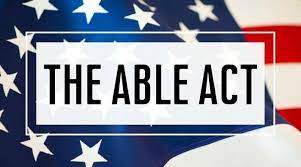The importance of financial planning.

If you or a loved one have a disability, then you know protecting assets and planning for financial stability is important. I have written about Special Needs Trusts and their advantages for saving. Another way to save is to open an ABLE account. ABLE accounts have been in the news recently because Congress just passed a bill to raise the age for qualifying from 26 to 46, though it won’t begin until 2026.
Why do you need to protect your child’s assets?
If your child has a disability and they receive Supplemental Security Income (SSI) or might receive SSI, you need to protect their assets. Having any assets/resources over $2000 will affect their ability to keep or qualify for SSI. SSI is for people with disabilities (or people over 65) with little or no income. In most states, people who receive SSI automatically qualify for Medicaid. This program is an important way for people with disabilities to have independence.
If your child receives any assets, like an inheritance, it affects their benefits.
- If the asset is more than $2000 or gives them more than $2000 in assets for a month, they will lose SSI. They can restore SSI once assets fall below $2000, but it will be at least one month and it is a pain to deal with!
- Any assets over $2000 can be subject to Medicaid payback.
Example: Your child inherits $6000.00 from a grandparent. They will lose SSI payments for as long as they take to spend down to less than $2000 in assets. You will need to prove to SSA that this has been done. All $6000 is subject to the government’s claim to pay any Medicaid benefits they have received.
Besides the loss of money that should help your child, think of the hassle you will have with SSA.
How does an ABLE account help?
The ABLE Act permits states to create tax-advantaged savings programs for people with disabilities. ABLE accounts are tax-free savings accounts (income tax-free at the federal level), though most of these individuals don’t pay federal income tax anyway, which will not affect their government benefits. These accounts operate like college savings (529) programs. Find information about ABLE accounts in your state here.
These accounts are not subject to gift tax restrictions and grow tax-free. Any person may contribute to an ABLE account for an eligible beneficiary. An ABLE account may not exceed the annual gift tax exemption ($17,000 in 2023). This amount is determined at the federal level. For SSI benefits, assets above $100,000 count as a resource, and ABLE is considered a resource. So, the account should not exceed this level. For Medicaid, if they lose SSI because of an ABLE account, they keep Medicaid uninterrupted. Check your state to see if you can claim contributions on taxes.
To qualify for an ABLE account, the beneficiary must have a disability that was diagnosed prior to age 26 (changes to age 46 in January 2026). The SSA definition of disability is- the inability to engage in any substantial gainful activity because of physical or mental impairment (s) that can be expected to last for a continuous period of not less than twelve months. They permit only one ABLE account per individual, but anyone can contribute to the account. Anyone can make cash or money order deposits to the account. You cannot hold real property in an ABLE account. You can deposit SSI money into an ABLE account to make sure a beneficiary does not reach the $2000 max for assets.
What is a qualified disability expense?
ABLE account money can pay for any qualified disability expense. This is a pretty broad category. You should spend the money on the care and support of the individual. If you use it for a non-qualifying expense, there will be a 10% IRS penalty.
Examples of a qualifying expenses:
- Education
- Housing
- Transportation
- Employment training and support
- Assistive technology and related services
- Health
- Prevention and wellness
- Financial management and administrative services
- Legal fees
- Expenses for ABLE account oversight and monitoring
- Funeral and burial
- Basic living expenses
After funeral and burial expenses, there is a Medicaid payback. This means Medicaid can collect reimbursement for anything they have paid for, even if it was before they created the account. If there is any money left over after the federal government, then anyone designated can inherit the money. It is important to always use public funds first so assets do not accumulate. Then, use ABLE for things public funds do not pay. Be sure to keep records in case the IRS asks.
Advantages of an ABLE account:
- Shields income
- Less expensive substitute for a Special Needs Trust
- Gives the individual financial control and independence
Additional information:

